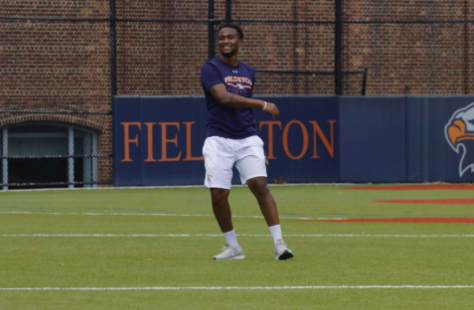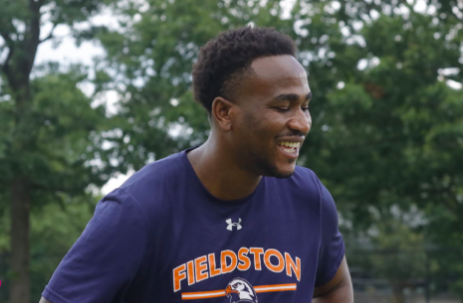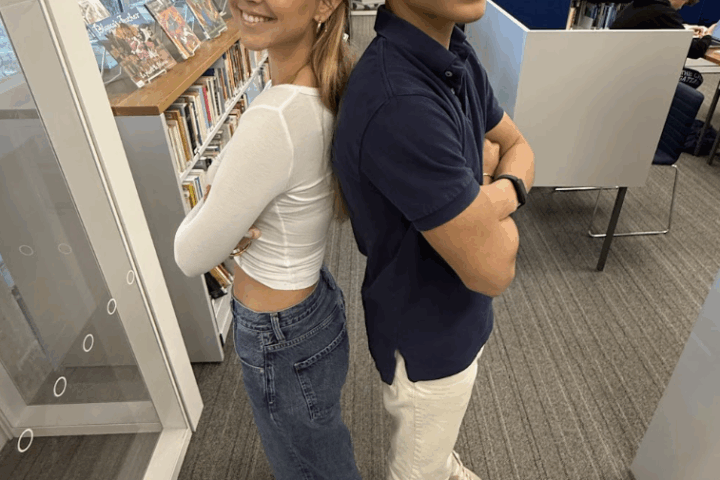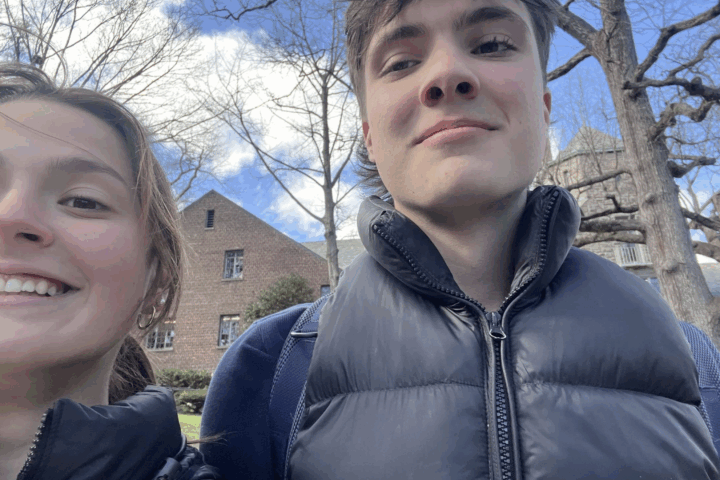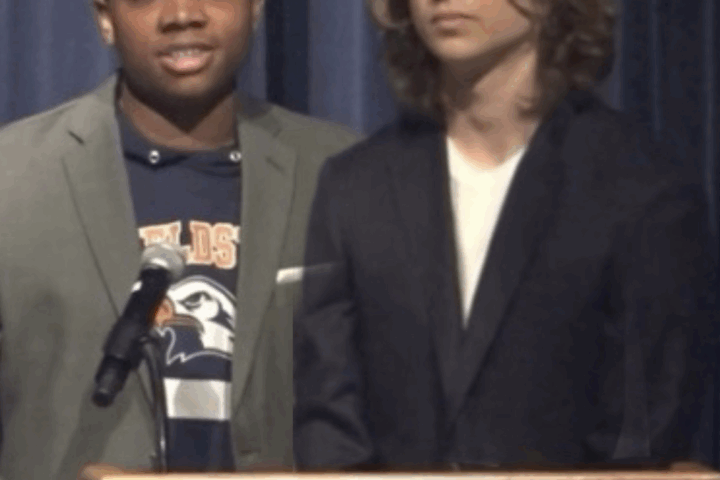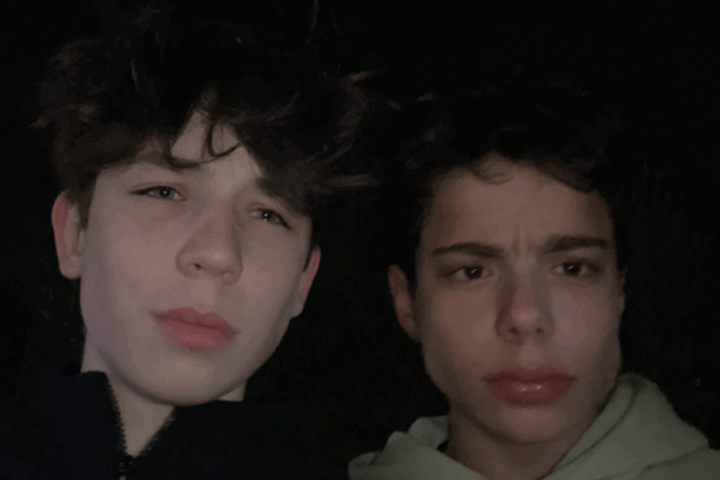On Monday, April 10, shrieks of joy erupted from the main floor of the Tate Library as a group of seven varsity girls soccer players celebrated a long-awaited decision. The source of their enthusiasm was an email confirming the promotion of former head junior varsity coach, Iyayi “Yaya” Imade, to head coach of the varsity team. Several members of the team had specifically contacted the athletics department to lobby for the promotion. Across the board, the team expressed delight at the news, a sentiment which Imade shared. “I’m really excited, because it offers me a chance to continue the project I’ve been working on for the past three and a half years – and I use the word project because I do see it as a project,” says Imade. “It’s a long term goal of mine, a big picture of play. It’s development over time, not a one season thing. To continue on that path is really amazing.”
The majority of the team has been previously coached by Imade on JV, or is familiar with him from preseason and occasional joint practices. “When I was on JV, I had him as my head coach,” says Sammy Stein (Form V). “That year was the most I’ve ever learned about soccer, and the most I’ve grown as a player.” Imade pushes his athletes to work hard – because he knows they can. Many anticipate that he will concoct an ideal balance of fitness, discipline and “tough love.” He brings out the best in the team, and his investment and faith in the players is reciprocated. “We strive for greatness when we’re with him, because we don’t want to disappoint him,” says Alexa Citron (Form IV). “In my opinion, he is the person who sees the most of our potential.”
Imade was raised in Germany and has played soccer seriously since around the age of nine. He played for four years on the varsity team at Martin Luther King High School in New York City and received a scholarship to play for another four at St. Lawrence University. He still competes on a men’s team, South Bronx United, and began coaching at Fieldston shortly before the pandemic. Imade’s style is heavily influenced by the German school of soccer, a mix between possession and positional play – and above all else, gegenpressing (which loosely translates in English to “counterpressing”). At its core, gegenpressing means that after a team loses possession of the ball, they push high up the field with a structure and intensity that forces an immediate turnover from the opponent. It requires high fitness, a developed positional understanding, and strong team chemistry. In general, Imade describes the optimal coaching approach as roughly 30% tactics and 70% social competence. Anyone can study training modules or curate a particular style of play, he says, but understanding how individuals respond to different instruction styles is key to effective coaching. “I can drill in on tactics all day. But if I don’t have good relationships and don’t understand all the unique individuals that formulate a team, I won’t get the best out of a player,” says Imade. “It’s really important for me that I also get to know the human being outside of the sport.”
In previous years, the team has struggled with communication between coaches and players. Season by season, it was hit and miss. Most players, including junior Roxy Shapiro and sophomore Adia Stokes, believe that Imade will mend the disconnect. With a renewed trust, they’ll be able to hone in on their technical skills. “He knows most of the players, exactly what their skills are, what their strengths and weaknesses are,” says sophomore Caitlin Neidow. “Going into the season and not really having to take the time to get to know people on the team sets us ahead already.”
While GVS won the NYSAIS Girls Varsity Soccer Championship in 2021, they did not qualify for the playoffs last season. The new coach enters with several objectives for the team – first and foremost, to make the NYSAIS playoffs and compete for the championship again. He hopes to cultivate a more concise and unified style of play, enough to impress onlookers – which entails gegenpressing, playing out of the back, and continuing to maintain a tight defensive line. “Yes, you can win without playing really well. Yes, you can win by being scrappy and being ugly. But for me, we want to win in a wholesome way. We want to win totally,” Imade says. And, of course, he wants to have fun.
Over the years, both Imade and Fieldston had prepared for him to step into the role. “I’ve really watched him sort of grow and develop as a coach and as a person,” says the Director of Athletics, Gus Ornstein. “He has all the skill set to be successful, and I love how excited and passionate he is about it.” Still, Imade completed the full job application process as any other applicant would. Typically, the athletics department posts a notice of job opportunity and identifies the most qualified two or three resumes. Then, Ornstein invites candidates in for an interview, and often introduces them to other members of the department for external feedback. Although the decision is ultimately Ornstein’s, he appreciates player insight. “In the end, they’re the ones they’re going to be out there every single day,” says Ornstein. “If their thoughts make sense, and their reasoning makes sense, which it usually does with our students, that input is valuable.”
Imade anticipates that the prominent difference between JV and varsity will be the quality of players. Rather than developing individuals one-on-one, there’s an increased big-picture focus on winning games. For players, it provides opportunities for increased freedom and independent problem solving on the field, which can occasionally result in clashes with coaches. “There’s gonna be challenges here and there, but I think, ultimately, we’ll iron everything out through communication, mediation, and a shared understanding,” says Imade, echoing players’ hopes.
“There will definitely be players who are quintessential to our success and other players who may not get as many minutes,” says Imade. “But one thing I do want to assure everyone is that if you come to training with an open heart, you work hard, you follow the rules, and you do all the right things, you will get something out of being on the soccer team. You’ll have a strong network of family to fall back on and speak to when you need help. You always have me as somebody that can provide guidance. And besides that, we’ll develop in a very holistic way. You’re not only improving on the soccer field, you’re improving as human beings as well.”
